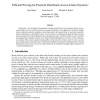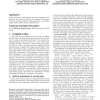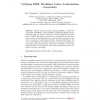857 search results - page 22 / 172 » A Formal Framework for Adaptive Access Control Models |
SACMAT
2009
ACM
14 years 2 months ago
2009
ACM
Traditional access control models, such as Role-Based Access Control (RBAC), do not take into account contextual information, such as location and time, for making access decision...
ESORICS
2007
Springer
13 years 11 months ago
2007
Springer
We present a new technique for generating a formal proof that an access request satisfies accesscontrol policy, for use in logic-based access-control frameworks. Our approach is t...
ICRA
2007
IEEE
14 years 1 months ago
2007
IEEE
— Recent advances in machine learning and adaptive motor control have enabled efficient techniques for online learning of stationary plant dynamics and it’s use for robust pre...
CCS
2008
ACM
13 years 9 months ago
2008
ACM
Usage control is a generalization of access control that also addresses how data is used after it is released. We present a formal model for different mechanisms that can enforce ...
BPM
2006
Springer
13 years 9 months ago
2006
Springer
Abstract. Business Process Execution Language (BPEL), or Web Services BPEL (WS-BPEL), is the standard for specifying workflow process definition using web services. Research on for...



